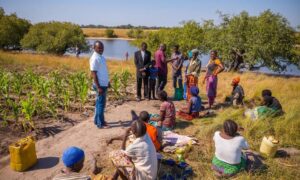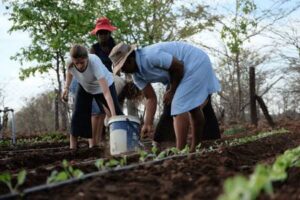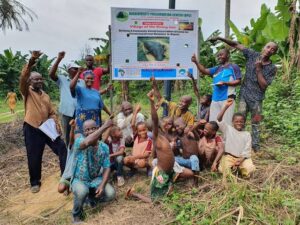Back to: Environmental Biology 300 Level
Welcome to class!
Have you ever visited a village where the forests are still rich with wildlife, or heard of a local community that protects their river or sacred grove like it’s part of their family? These are examples of community-based conservation—when people living close to nature take the lead in protecting it. Today’s lesson will show you how conservation isn’t only about big government programmes. Sometimes, the most effective environmental protection happens when local communities are in charge.
Community-Based Conservation Projects
What is Community-Based Conservation?
Community-Based Conservation (CBC) is an approach that places local people at the centre of efforts to protect and manage natural resources. Instead of conservation being imposed from the top, communities themselves make decisions, set rules, and take responsibility for their surrounding environment. It combines local knowledge with sustainable practices to protect biodiversity while improving livelihoods.

Key Principles of Community-Based Conservation
Participation: Community members are fully involved in planning, decision-making, and implementation.
Empowerment: Communities are given the tools, training, and authority to manage their resources.
Sustainability: The conservation methods ensure resources are not overused and will remain for future generations.
Equity: Benefits from conservation—like jobs, income, or access—are shared fairly among community members.
Cultural Respect: CBC recognises traditional beliefs, sacred sites, and indigenous ways of managing nature.
Why Community-Based Conservation Works
People who live closest to nature understand it best.
It reduces conflicts between conservation authorities and locals.
It promotes stewardship—people protect what they feel responsible for.
It often leads to better and longer-lasting conservation outcomes.
Examples of Community-Based Conservation in Nigeria
Gashaka-Gumti National Park (Taraba & Adamawa): Local communities around the park have been engaged in protecting forests, with support from NGOs and the government.

Yankari Game Reserve (Bauchi): Nearby communities help report poachers and protect elephants by guiding eco-tourists.
Sacred Groves in Yorubaland: These traditional forests are protected for spiritual reasons but also preserve biodiversity.
Niger Delta Mangrove Conservation: Fishermen and women’s cooperatives are involved in mangrove restoration to support fisheries and control erosion.
Lekki Conservation Centre (Lagos): A good urban example where local schools, businesses, and communities partner to protect wetlands and teach environmental education.
Challenges of Community-Based Conservation
Lack of adequate funding and resources.
Poor enforcement of community-made rules.
Conflicts over land ownership and resource use.

External threats like illegal logging or mining.
Sometimes, community members need more training or awareness.
Summary
- Community-Based Conservation puts local people in charge of protecting natural resources.
- It involves participation, empowerment, sustainability, equity, and cultural respect.
- It works well because people protect what they own and understand.
- Nigerian examples include sacred groves, national parks, and mangrove projects.
- Challenges include lack of funding, weak enforcement, and external threats.
Evaluation
- What is Community-Based Conservation, and why is it important?
- Mention three principles of community-based conservation.
- Give two examples of CBC projects in Nigeria.
- List two challenges CBC projects often face.
- Explain how culture can support conservation in local communities.
Well done! You’ve just seen how powerful communities can be when it comes to environmental protection. With the right support, training, and respect, local people are some of nature’s best defenders. Keep learning and keep believing—you’re part of a generation that can make conservation a way of life. Afrilearn is cheering for you every step of the way.
